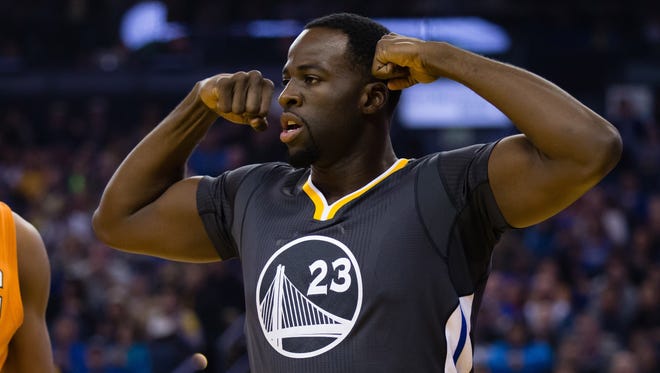Draymond Green's agent blasts NBA stance on 'unnatural acts'
If ever there was an NBA player who wasn’t afraid to speak up for himself, it is Draymond Green.

But before the Golden State Warriors forward had a chance to chime in on the league’s shot across his bow on Sunday, when executive vice president of basketball operations Kiki VanDeWeghe spoke to USA TODAY Sports and several other media outlets about their latest ruling on one of his infamous leg kicks and the debate about "unnatural acts" during play, his agent beat him to it.
B.J. Armstrong, a three-time champion with the Chicago Bulls who now represents players for the Wasserman Media Group, is not happy about the NBA’s style or stance.
NBA says Draymond Green not being singled out
"The fact that everyone is trying to cover their positions or justifying why they did what they did, the (league's perspective) was kind of disappointing from this viewpoint: Since I’ve been a part of this league, I can’t recall when they’ve actually made rules that have actually helped to improve the game of basketball," Armstrong, whose client was given a Flagrant-1 foul when he kicked Houston Rockets star James Harden on Thursday, told USA TODAY Sports by phone.
"Every move has been made with some motive, to make the game look a certain way, to speed the game up, to do all of these things. But what, when the competition committee — whoever those people are — what have they actually done to improve the game of basketball? ... Not to put more people in the stands, not to make the game more appealing for people globally. What has been done to improve the game of basketball? That’s it. That’s it. That’s my only question."

As VanDeWeghe detailed, the competition committee — which is made up of league executives, owners, general managers, coaches, player and official representatives — includes several longtime former NBA players. But Armstrong, who remembers a time when officials used to warn him about driving the lane for fear of what teams like the bad boy Detroit Pistons might do if he went too far, isn’t buying the league’s logic. In essence, he believes that the NBA’s insistence on limiting a certain type of physical play is a clear sign that they prioritize business over basketball.
Green had plenty to say in recent days on social media, where he not only tweeted that he was a "marked" man but posted pictures of those late 1980s and early 1990s Pistons as a clear sign of how he saw the situation. Green said even more after Warriors shoot-around on Saturday, when he spoke at length about the way these types of plays are handled by the league office and said of the decision makers, "A lot of these guys that make the rules can’t touch the rim, yet they tell you how you’re way up there in the air which way your body (should go)." Armstrong, quite clearly, agrees that the league is being policed with profits in mind.
USA TODAY Sports' NBA triple-double tracker
"People flail, people do things, and their bodies respond in certain ways," Armstrong said. "I think it (the play with Harden) is a no-call. ... When I played, I would never, ever try to run Reggie Miller off the line because I knew Reggie. If I ran at him, and I was trying to run him off the line, I was going to get kicked. I knew that, and people around the league knew that. And players always adjust."
For Armstrong, the most frustrating part of it all was that Green’s opinion - as he sees it - isn't being heard.
"Let’s listen to what the people who are actually performing in the game need, OK?" he said. "As a parent, when I fail to listen to my kids, when our kids stop bringing us our problems, we have all failed as parents and as leaders. That’s how I felt, really, when I read (the league’s stance).
"It was so disappointing, because our kids, our players, are bringing us the issues that they have. And when they stop bringing that to us, and we stop listening to our kids, and we stop listening to the players that perform in it, and we start doing all the other things that line our pockets, or make the game look a certain way, or whatever our pitch is, we fail. We’ve failed as leaders. We’ve failed as coaches. We’ve failed as executives. That’s what I felt, when I read it."
Follow Sam Amick on Twitter @sam_amick.